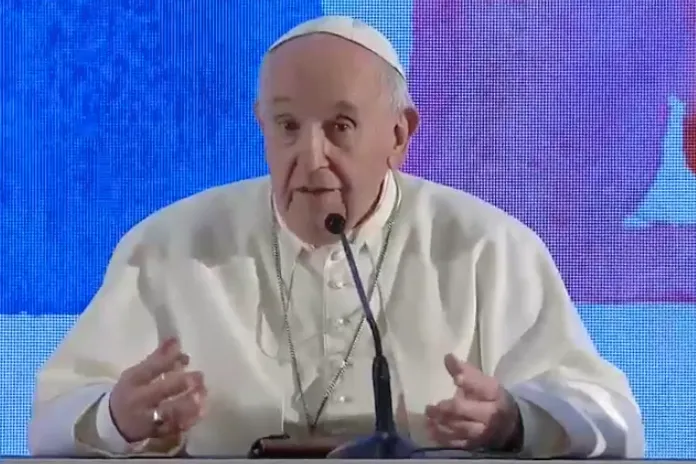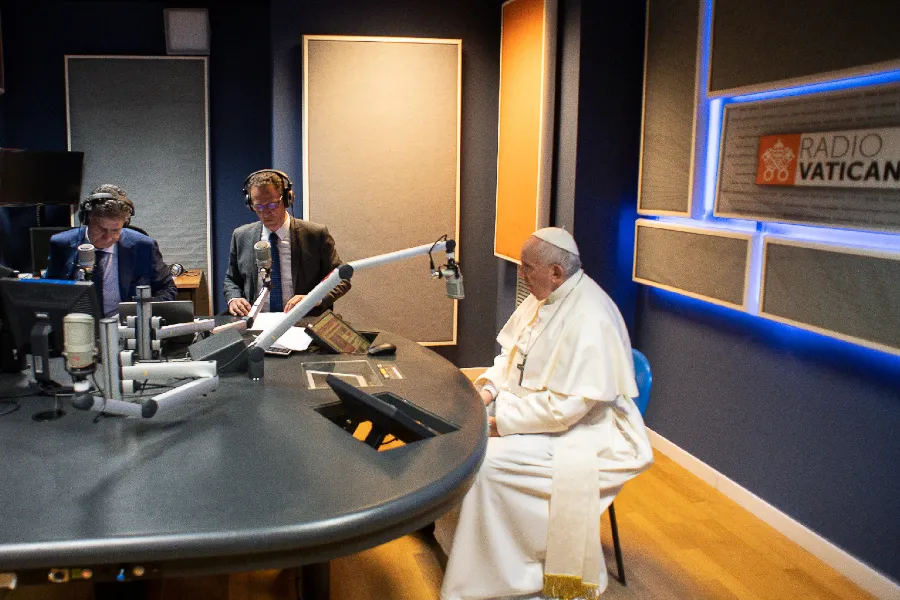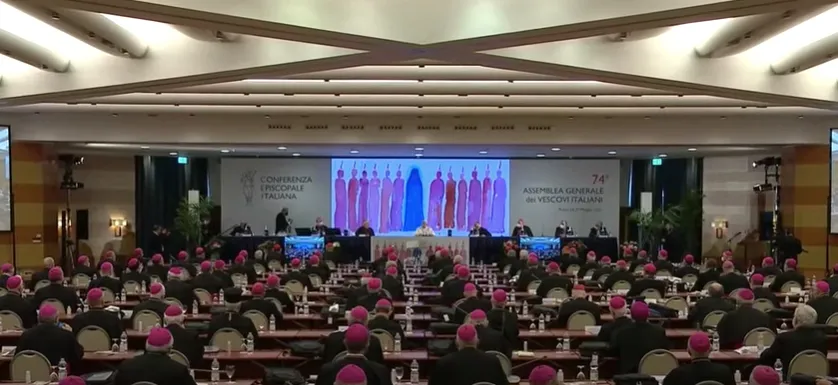
Much ink was spilt this past week over a punchy essay in a religious publication under the by-line of a clergyman from Northern Europe who had something to say about the current state of the Church—and said it. Normally, a cleric writing an essay for a religious paper on a religious subject is pretty dog-bites-man, as far as stories go. This time, however, the cleric was the Cardinal Archbishop of Utrecht, Willem Jacobus Eijk, the paper was the National Catholic Register, and the topic was “a drift towards apostasy from the truth” for which Pope Francis is supposedly responsible, because of his “fail[ure] to maintain and transmit faithfully and in unity the deposit of faith contained in Sacred Tradition and Sacred Scripture,” particularly insofar as Holy Communion is concerned.
In short: a Cardinal with voting rights, who has been Archbishop of a major metropolitan See of historic importance since 2007, went on the record to observe—not to argue or inveigh, but to state his view of the matter as far as the facts of it are concerned—that “the bishops and, above all, the Successor of Peter fail to maintain and transmit faithfully and in unity the deposit of faith contained in Sacred Tradition and Sacred Scripture,” and proceeded to say that the current state of affairs is to him redolent of the tribulation that awaits the Church in the end times.
Whatever one should decide to call that, “normal” would be a poor word choice.
Cardinal Eijk principally addressed himself to the fact that a sizable majority of the German bishops voted in conference to draft and adopt a “pastoral handout” detailing the circumstances under which the bishops believe a non-Catholic Christian spouse of a Catholic may licitly receive Holy Communion in a Catholic church. The bishops in favor argue that there exists a “grave necessity” in the form of the threat to the health and even survival of such marital unions and to the faith of the Catholic part therein, stemming from the prohibition on non-Catholics’ reception of Holy Communion. In sum, they believe that, if such couples cannot—or believe they cannot—receive Communion together in a Catholic church, the marriage will break up or the Catholic spouse will defect. The bishops in favor also argue that there is need for such a guiding pastoral framework, since many non-Catholic spouses in such unions already take Communion with their spouses in Catholic churches.
Supporters of the measure believe it to be in strict obtemperance with pertinent law (Can. 844§4 for those of you following from home), which does envision communicatio in sacris for non-Catholics under certain very limited circumstances, and provided the non-Catholic has professed Catholic faith in the Sacrament and is otherwise properly disposed.
The bishops in the minority maintain that the law is meant to provide for persons who come from traditions with valid sacraments, who find themselves in emergencies. Lutheran sacraments are not valid, and Lutherans in Germany claiming their situation constitutes an “emergency” in any pertinent sense of the term will surely have a long row to hoe to make their case. In any case, representatives of the minority bishops wrote to Rome to ask the Vatican for help in resolving the dispute, citing also the universal import of the issue — sacramental unity — and the opportunity therefore of resolution at the highest levels of Church governance.
Rome held a one-day mediation session with prelates from both sides, and sent the delegations home to solve it amongst themselves.
Plenty of people on both sides of the controversy tried—and continue to try—to spin the outcome favorably. The truth is, exactly no one was satisfied with the result, or rather the non-result. Cardinal Eijk was particularly disappointed:
The Holy Father should have given the delegation of the German episcopal conference clear directives, based on the clear doctrine and practice of the Church. He should have also responded on this basis to the Lutheran woman who asked him on November 15, 2015 if she could receive Communion with her Catholic spouse, saying that this is not acceptable instead of suggesting she could receive Communion on the basis of her being baptized, and in accordance with her conscience. By failing to create clarity, great confusion is created among the faithful and the unity of the Church is endangered.
There are two major takeaways from this address of the problem. The first is that it sets in relief the way pastoral concerns are apt to become problems of governance in this pontificate.
The second thing is that these really are problems of governance.
The basic dynamic is this: Pope Francis receives a query from a person or group requiring clarification of an issue pertinent to the life of faith; he responds in a pastoral register, apparently careless of the implications his response might have for matters of order and governance within the Church more broadly considered; people take the pastoral considerations—often assuming, because he is the supreme governor of the universal Church, that they are—as universally applicable statements of principle or general license; hijinks ensue; Pope Francis leaves people to work things out on their own.
If this happens once, or even twice, one may dismiss it as a rookie mistake or an inevitable misstep. For Francis, however, this sort of thing is typical. If he is still doing it, it is fair to assume he is doing it because he wants something from it, and believes he is getting what he wants. However sound his pastoral advice, the Roman Pontiff is not only a pastor, but a governor, and one thing of which we can be sure is that he knows it. It is reasonable to desire to see him more mindful—or at least less selectively mindful—of this fact. The lines separating the three munera of teaching, sanctifying, and governing may be found bright on the theological map, but the real-life borders those lines represent are gossamer and porous. Some policing of them is necessary, and that is why the power of the Papal office exists. It is also why its exercise is a delicate and even dangerous matter.
One may not like the way Pope Francis does the policing, and might even criticize him for it. For the time being, though, we have to live with it, and with each other. One may, as Cardinal Eijk did, question the prudence of the Pope’s governance and even point out the dangers to the faith, which his perceived mistakes engender or exacerbate, without, however, calling his faithfulness as such into doubt. The Pope’s critics do well when they avoid impugning the Holy Father’s fidelitas (or, I hasten to add, his bona fides), while his supporters must remember that his prudence is fair game.
I’d say that history will have to judge whether Pope Francis’ conduct of the office with which he has been entrusted will have been good and fruitful, but Cardinal Eijk apparently thinks history may not get the chance to pronounce itself on the matter. I only note that we have always believed—always known as an article of faith—that we are in the end times, that the Lord is coming soon. The Church decided a long time ago that it is unhealthy to encourage as a matter of general practice, speculation about just how close we are.
If you value the news and views Catholic World Report provides, please consider donating to support our efforts. Your contribution will help us continue to make CWR available to all readers worldwide for free, without a subscription. Thank you for your generosity!
Click here for more information on donating to CWR. Click here to sign up for our newsletter.







“One may, as Cardinal Eijk did, question the prudence of the Pope’s governance and even point out the dangers to the faith, which his perceived mistakes engender or exacerbate, without, however, calling his faithfulness as such into doubt. The Pope’s critics do well when they avoid impugning the Holy Father’s fidelitas (or, I hasten to add, his bona fides), while his supporters must remember that his prudence is fair game.”
Au contraiare! It is precisely the Pope Bergoglio’s fidelitas and bona fides that Cardinal Eijk is explicitly and unequivocally calling into question when he refers to “a drift towards apostasy from the truth” and “fail[ure] to maintain and transmit faithfully and in unity the deposit of faith contained in Sacred Tradition and Sacred Scripture.” It should be evident and is in fact beyond cavil or controversy that these actions and omissions are emphatically not matters of “prudence” but of dogmatic deviation from Divine Revelation as contained in Scripture, Sacred Tradition, and the Magisterium that evidence of Pope Bergoglio’s now-routine dereliction in and abuse of his exercise of his triplex munus of ruling, teaching, and sanctifying.
“Bona fides” refers to whether Pope Francis is really the Pope. Only a few outliers with zero evidence maintain this, so we can put that one aside. “Fidelitas”, I assume in this context, refers to the idea that Pope Francis is honestly trying to do the best thing as he sees it. In other words, he is not deliberately, knowingly trying to destroy the faith. At least that is what I think Mr. Altieri meant by these two words. Pope Francis can do a lot of damage, but we should at least admit he is the real Pope and he is merely going down a dangerous path, not because he wants to destroy the church, but just because he has no idea what he is doing.
Doesn’t know what he is doing? He MUST know exactly what he is doing!
To me, the very fact that Pope Francis favors communion for adulterers (“There are no other interpretations”) DOES call his faithfulness into question. Can someone explain why I’m wrong?
Cardinal Willem Jacobus Eijk Utrecht is an exception and great blessing. A throw back to the Dutch missionary priests I knew in Africa who were instrumental to my vocation. Cardinal Eijk has faith, courage, and insight pointing out the obligation of the Pontiff to give us clarity. To govern. Eijk however knows, as many of us do by now that the withholding of definitive teaching and clarity on vital issues is not likely forthcoming because it’s part of the Pontiff’s strategy of Paradigmatic change detailed by ‘spokesmen’ Cardinal Kasper and Fr Spadaro SJ. Cardinal Eijk unlike others tells it precisely as he perceives it citing Article 675 of the Catechism. Cardinals Caffarra Burke and other prelates had previously made reference to End Times citing not simply confusion but growing repudiation of doctrine and apostasy. Permitting communion for Protestant spouses by Germany is an apparent “first step” according to plan for communion understood as a charitable gesture soon to be available for all Protestants forming with Catholics a loosely integrated body, the Pope’s Paradigmatic vision, which by now should be clear to everyone though not for some of an all inclusive Christian church. Communion for D&R as other ‘exceptions’ become general practice will soon be a moot issue. The Mystical Body if Pope Francis continues his policy will no longer be a radical witness of Christ to the world. That is our challenge and this is the battle centered at the very heart of our Catholic faith. The Holy Eucharist. Political correctness must not inhibit witness to justice and truth. As long as we remain faithful we are that radical witness to the world.
I wish to attach this Addendum: Neither Archbishop Eijk, nor Cardinals named nor do I pretend certainty regards End Times, although the disparity of faith and practice evident in the Pontiff’s tacit at times overt policy of delegating by inaction authority for Bishops Conferences to change both is evident. And the widespread disunity of belief is clearly opposed to the unity of one faith in Christ. The premise of mercy devoid of justice resembles at least a “religious deception”. The Holy Spirit doesn’t divide the faithful. The Revelation of Christ is not subject to change. I won’t go so far as to judge the Pontiff’s bona fides. I must judge his actions, his prudence and their effects. I agree with the author to that extent and that seeking a middle road position on this monumental issue of faith and practice is suitable to the purpose of open discussion that suits this particular forum as different from others.
Reforming the Patriarchate of Rome is too great a task for Pope Francis and if he deems himself incapable of the task, he should resign.
Well, since the Mass centers on the Holy Eucharist, what point is there to be Catholic if the reception of the Host boils down to simple desire?
The Protestant rejects the Catholic Church but wants and demands the Eucharist it consecrates?
Like the pastoral reasoning in AL, desire and the imagined threat of social disharmony now trump the truth.
To quote the most quoted words of the man who presided over the most famous execution in history: What is truth?
“I am come to cast fire on the earth; and what will I, but that it be kindled?
And I have a baptism wherewith I am to be baptized: and how am I straitened until it be accomplished?
Think ye, that I am come to give peace on earth? I tell you, no; but separation.
For there shall be from henceforth five in one house divided: three against two, and two against three.
The father shall be divided against the son, and the son against his father, the mother against the daughter, and the daughter against the mother, the mother in law against her daughter in law, and the daughter in law against her mother in law.
And he said also to the multitudes: When you see a cloud rising from the west, presently you say: A shower is coming: and so it happeneth:
And when ye see the south wind blow, you say: There will be heat: and it cometh to pass.
You hypocrites, you know how to discern the face of the heaven and of the earth: but how is it that you do not discern this time?
And why even of yourselves, do you not judge that which is just?”
(Our Lord Jesus Christ, Gospel of Luke 12, 49-57)
Thank you, Cardinal Eijk, for calling a spade a spade.
The bishop of Rome and his lieutenants despise clarity.
Except when using the words “coprophilia” and “coprophagia”, of course.
Regarding end times speculation, the Church tells us not to try to fix a date. To speculate, however, is fair game. Otherwise why bother telling us anything of the signs that will precede the end? Why not just state that there will be an end and leave it there? No, Mr. Altieri, we can absolutely look at the signs of the times and speculate that many signs seem to align with the signs for which we were told to look!
Regarding the rest, this is much more than just a pastoral issue: the validity or point of every sacrament save extreme unction is called into question. We can baptized anywhere by anybody–an atheist or a satanic priest can baptize validly–as long as the form is correct. So we already do not require the Church for baptism. If we’re then going down the road of permitting anybody to take communion then confession, communion, confirmation, matrimony and holy orders collapse, too. Sure, the church—certainly the money grubbing Germans–may try to maintain that the sacraments are valid but they will not have a leg to stand on in making that claim.
And to be frank, it is astounding to me that so many Catholic journalists seem incapable of or unwilling to use reason to game out the consequences of what’s going on here.
It is not Pope Francis! Pope Francis is listening to Cardinal Pell, who is running things. We have Apartheid in Australia but covered up due to being a prison colony. The Australian Catholic Church is a National church as the Dutch Reformed Church was in South Africa. We cannot get our stories heard as it is blocked domestically and when we try overseas. The Australian Catholic Church already gives Gays, Anglicans, remarried our Catholic Communion, now the State religion must be put in Rome. If you can help us, my email is jmc8682001@gmail.com. We welcome overseas media. Please note, all communications is monitored in Aus.